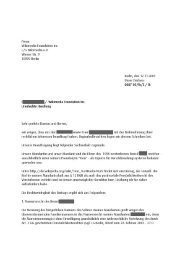Proceedings
Proceedings
Proceedings
You also want an ePaper? Increase the reach of your titles
YUMPU automatically turns print PDFs into web optimized ePapers that Google loves.
| 118<br />
7 AUTOMATED EXPLOITATION 15<br />
When running the exploit client-automatic, an attached strace shows<br />
that the right functions are executed in the right order. This time the<br />
system-calls are actually shown in the trace-log but thats OK since the<br />
triggered libc calls will eventually call the corresponding system calls.<br />
linux:˜ # strace -i -f -p 7020<br />
Process 7020 attached - interrupt to quit<br />
[ 2aaaaac7bd72] accept(3, 0, NULL) = 4<br />
[ 2aaaaac4fe4b] clone(Process 7227 attached<br />
child_stack=0, flags=CLONE_CHILD_CLEARTID|CLONE_CHILD_SETTID|SIGCHLD, child_tidptr=0x2aaaaade8b90) = 7227<br />
[pid 7020] [ 2aaaaac6ed12] close(4) = 0<br />
[pid 7020] [ 2aaaaac7bd72] accept(3, <br />
[pid 7227] [ 2aaaaac6ee22] write(4, "OF Server 1.0\n", 14) = 14<br />
[pid 7227] [ 2aaaaac6ed92] read(4, "XXXXXXXXXXXXXXXXXXXXXXXXXXXXXXXX"..., 4096) = 4096<br />
[pid 7227] [ 2aaaaac6ee22] write(4, "OK\n", 3) = 3<br />
[pid 7227] [ 2aaaaac50bd9] setuid(0) = 0<br />
[pid 7227] [ 2aaaaac4fe4b] clone(Process 7228 attached<br />
child_stack=0, flags=CLONE_CHILD_CLEARTID|CLONE_CHILD_SETTID|SIGCHLD, child_tidptr=0x2aaaaade8b90) = 7228<br />
[pid 7227] [ 2aaaaac50e7d] setresuid(1, 2, 3) = 0<br />
[pid 7227] [ 2aaaaac6ed12] close(42) = -1 EBADF (Bad file descriptor)<br />
[pid 7227] [ 2aaaaac78579] munmap(0x2aaaaaac2000, 4096) = 0<br />
[pid 7227] [ 2aaaaac500fa] exit_group(1) = ?<br />
Process 7227 detached<br />
[pid 7020] [ 2aaaaac7bd72] 0, NULL) = ? ERESTARTSYS (To be restarted)<br />
[pid 7020] [ 2aaaaac7bd72] --- SIGCHLD (Child exited) @ 0 (0) ---<br />
[pid 7020] [ 2aaaaac4f6d4] wait4(-1, NULL, WNOHANG, NULL) = 7227<br />
[pid 7020] [ 2aaaaac4f6d4] wait4(-1, NULL, WNOHANG, NULL) = -1 ECHILD (No child processes)<br />
[pid 7020] [ 2aaaaabeff09] rt_sigreturn(0xffffffffffffffff) = 43<br />
[pid 7020] [ 2aaaaac7bd72] accept(3, <br />
[pid 7228] [ 2aaaaac50e7d] setresuid(1, 2, 3) = 0<br />
[pid 7228] [ 2aaaaac6ed12] close(42) = -1 EBADF (Bad file descriptor)<br />
[pid 7228] [ 2aaaaac78579] munmap(0x2aaaaaac2000, 4096) = 0<br />
[pid 7228] [ 2aaaaac500fa] exit_group(1) = ?<br />
Process 7228 detached<br />
Everything worked as expected, even the fork(2) which can be seen by<br />
the the spawned process. I don’t want to hide the fact that all the exploits<br />
send 0-bytes across the wire. If the target process introduces strcpy(3)<br />
calls this might be problematic since 0 is the string terminator. However,<br />
deeper research might allow to remove the 0-bytes and most overflows<br />
today don’t happen anymore due to stupid strcpy(3) calls. Indeed even<br />
most of them accept 0 bytes since most overflows happen due to integer<br />
miscalculation of length fields today.<br />
Eventually we want to generate a shellcode which executes a shell. We<br />
still use the same vulnerable server program. But this time we generate a<br />
stack which also calls the system(3) function instead of the dummy calls<br />
from the last example. To show that its still a calling sequence and not just<br />
a single function call, the UID is set to the wwwrun user via the setuid(3)<br />
function call. The problem with a call to system(3) is that it expects a<br />
pointer argument. The code generator however is not clever enough 4 to<br />
find out where the command is located. Thats why we need to brute force<br />
the argument for system(3) within the exploit. As with common old-school<br />
exploits, we can use NOP’s to increase the steps during brute force. We<br />
know that the command string is located on the stack. The space character<br />
’ ’ serves very well as a NOP since our NOP will be a NOP to the system(3)<br />
argument, e.g. we can pass "/bin/sh" or " /bin/sh" to system(3).<br />
NO-NX<br />
4Not yet clever enough. It is however possible to use ptrace(2) to look for the address of certain<br />
strings in the target process address space.






